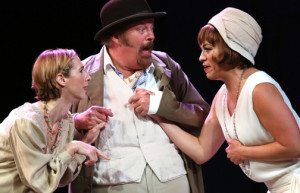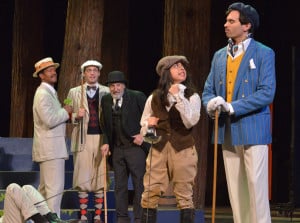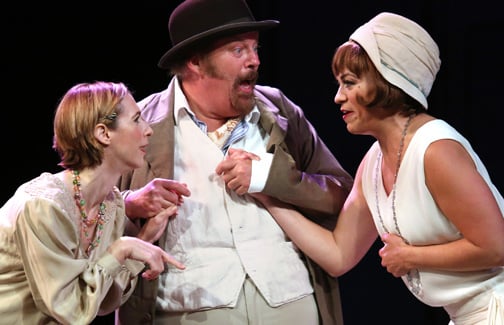
It’s a shame that “The Merry Wives of Windsor” will be where some audiences first meet one of Shakespeare’s greatest creations, Falstaff. Although the play was written as a showcase for him after he stole the show in the Elizabethan productions of “Henry IV, Part 1,” he’s merely a shadow of his former self. Yes, Falstaff was plump, drunk, larcenous, witty and prone to lying in “Henry IV, Part 1” and “Henry IV, Part 2,” and that’s why he was such a crowd pleaser. But that was only half the story. He was a lonely man, struggling with aging, who used humor as a defense mechanism. But the wise man who cleverly declared “the better part of valor is discretion” and that the only man with honor is “he that died o’Wednesday” is entirely absent from “The Merry Wives of Windsor.” Without that emotional context and without that depth of character, Falstaff’s shenanigans are mildly charming, thoroughly preposterous and barely memorable.
So why does anyone still bother putting it on? Why not keep Falstaff where Falstaff belongs, in the company of Prince Hal? Santa Cruz Shakespeare (SCS) may have the best excuse. In its previous incarnation as Shakespeare Santa Cruz, it’s been mounting one Falstaff play per year, starting with “Henry IV, Part 1” in 2011 and finishing with “Henry V” last year. Loyal SSC patrons will benefit from the knowledge of the of the cast of characters that Falstaff surrounds himself with from the previous plays — Bardolph, Pistol, Nym, Mistress Quickley — but might also end up disappointed, as I was, that they too are lame, undifferentiated versions of themselves in “The Merry Wives of Windsor.”

The text is hardly Shakespeare’s finest, but SCS does a fine job serving up a production that can boast a few laughs and some entertaining performances. The silly plot involves Falstaff’s (Richard Ziman) failed attempts to woo a pair of wealthy married ladies — Mistress Ford (Julia Coffey) and Mistress Page (Greta Wohlrabe) — for their money. He makes a miscalculation by sending them both the same awful love letter with each one’s name inserted: “’Ask me no reason why I love you; for though / Love use Reason for his physician, he admits him/ not for his counsellor. You are not young, no more / am I; go to then, there’s sympathy: you are merry, / so am I; ha, ha! Then there’s more sympathy: you / love sack, and so do I; would you desire better / sympathy?” But since the women are friends, they share the letters with each other. They devise a plan to make Falstaff pay for his crudeness, which includes luring him into a giant basket of soiled laundry.
When Mistress Ford’s husband gets wind of what’s going on, he grows jealous. So he disguises himself as a sailor, looking an awful lot like Tony Curtis in “Some Like It Hot,” and asks Falstaff to woo Mistress Ford on his behalf for a fee. Miscommunications fuel the comedy.
Meanwhile, three suitors, defined as caricatures by their costumes, are after the heart — and fortune — of Mistress Page’s daughter, Anne Page. There’s the goofy Abraham Slender (Dan Flapper), decked out in a golfing outfit complete with argyle socks and a golf club to use as a walking stick: At one point, he even starts devouring it while calling it Anne Page. He’s been instructed to marry her by Justice Shallow (Marcus Cato), and cares little about the matter.

His main competition is the French Doctor Caius (William Elsman), whose English is a touch better than Princess Kate’s in “Henry V” but is still the butt of many jokes. Here’s a sampling of his dialogue: “Vat is you sing? I do not like des toys. Pray you, / go and vetch me in my closet un boitier vert, a box, / a green-a box: do intend vat I speak?” But the very tall and gangly Elsman always elevates his parts, making Caius the most compelling suitor despite not being the most suitable one. Finally, there’s Fenton (Hugh Coles), the only suitor not vouched for by one of the elders in Miss Page’s life, but who steals Miss Page’s heart.
Director Kirsten Brandt’s production aims for accessibility but sacrifices subtlety in the process. There’s plenty of bawdy humor in the play, and Brandt insists on illustrative gestures to accompany all the dialogue, just in case you might have missed the sexual innuendos. I found this tedious, but I did notice the woman to my left was laughing heartily. Nevertheless, there’s much to be said for ensuring that the majority of the laughs in the play come from the witty text, and Brandt does a fine job here.
Yet there’s something stagnant about the action and dialogue: Everything is delivered just a touch too slowly, so that rather than being swept up in the silliness, there’s too much time to contemplate it. That may be a function of trying to ensure all the lines get heard and understood, but it’s to the detriment of the show’s vitality and vivacity. It’s also unfortunate that Brandt has inserted a few unnecessary modern serenades of “Singin’ in the Rain” and “I Wanna Be Loved By You,” as well as a gratuitous Maurice Chevalier joke. Nevertheless, this is a serviceable production of a play that’s not often staged — for good reason — which makes the trek to Santa Cruz worthwhile.
“The Merry Wives of Windsor” runs until August 10 at the Glen Theatre at UC Santa Cruz. For tickets and more information, visit the Santa Cruz Shakespeare website here. All tickets are just $16 for full time students with ID.
